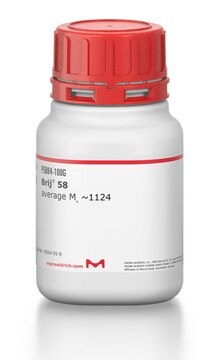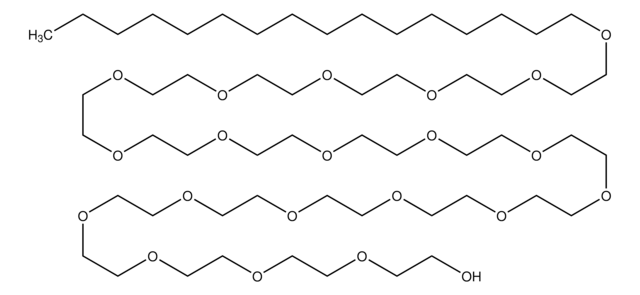STS0210
ECO BRIJ® C10
Synonym(s):
Brij® C10, Polyethylene glycol hexadecyl ether, Polyoxyethylene (10) cetyl ether
About This Item
Recommended Products
description
non-ionic
Quality Level
form
solid
mol wt
average Mn ~683
greener alternative product characteristics
Use of Renewable Feedstocks
Design for Degradation
Learn more about the Principles of Green Chemistry.
mp
32-34 °C (lit.)
acid number
≤1.0 mg KOH/g
hydroxyl value
75‑90 mg KOH/g
density
0.977 g/mL at 25 °C (lit.)
HLB
12.9
greener alternative category
SMILES string
CCCCCCCCCCCCCCCCOCCOCCOCCOCCOCCOCCOCCOCCOCCOCCOCCOCCOCCOCCOCCOCCOCCOCCOCCOCCO
InChI
1S/C56H114O21/c1-2-3-4-5-6-7-8-9-10-11-12-13-14-15-17-58-19-21-60-23-25-62-27-29-64-31-33-66-35-37-68-39-41-70-43-45-72-47-49-74-51-53-76-55-56-77-54-52-75-50-48-73-46-44-71-42-40-69-38-36-67-34-32-65-30-28-63-26-24-61-22-20-59-18-16-57/h57H,2-56H2,1H3
InChI key
NLMKTBGFQGKQEV-UHFFFAOYSA-N
Looking for similar products? Visit Product Comparison Guide
Related Categories
General description
Application
Features and Benefits
- 100 % Renewable
- 100 % Bio-based
- Certified to the USDA BioPreferred Program
- Lower carbon footprint than petrochemical-based versions
- High-purity chemical suitable for a wide variety of research applications
Other Notes
Legal Information
Hazard Statements
Precautionary Statements
Hazard Classifications
Aquatic Chronic 2
Storage Class Code
11 - Combustible Solids
WGK
WGK 2
Flash Point(F)
302.0 °F - closed cup
Flash Point(C)
150 °C - closed cup
Choose from one of the most recent versions:
Certificates of Analysis (COA)
Sorry, we don't have COAs for this product available online at this time.
If you need assistance, please contact Customer Support.
Already Own This Product?
Find documentation for the products that you have recently purchased in the Document Library.
Our team of scientists has experience in all areas of research including Life Science, Material Science, Chemical Synthesis, Chromatography, Analytical and many others.
Contact Technical Service






